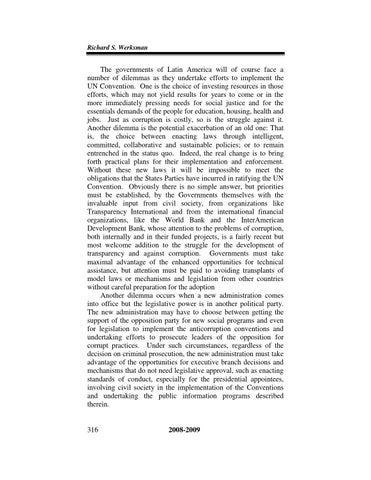Richard S. Werksman
The governments of Latin America will of course face a number of dilemmas as they undertake efforts to implement the UN Convention. One is the choice of investing resources in those efforts, which may not yield results for years to come or in the more immediately pressing needs for social justice and for the essentials demands of the people for education, housing, health and jobs. Just as corruption is costly, so is the struggle against it. Another dilemma is the potential exacerbation of an old one: That is, the choice between enacting laws through intelligent, committed, collaborative and sustainable policies; or to remain entrenched in the status quo. Indeed, the real change is to bring forth practical plans for their implementation and enforcement. Without these new laws it will be impossible to meet the obligations that the States Parties have incurred in ratifying the UN Convention. Obviously there is no simple answer, but priorities must be established, by the Governments themselves with the invaluable input from civil society, from organizations like Transparency International and from the international financial organizations, like the World Bank and the InterAmerican Development Bank, whose attention to the problems of corruption, both internally and in their funded projects, is a fairly recent but most welcome addition to the struggle for the development of transparency and against corruption. Governments must take maximal advantage of the enhanced opportunities for technical assistance, but attention must be paid to avoiding transplants of model laws or mechanisms and legislation from other countries without careful preparation for the adoption Another dilemma occurs when a new administration comes into office but the legislative power is in another political party. The new administration may have to choose between getting the support of the opposition party for new social programs and even for legislation to implement the anticorruption conventions and undertaking efforts to prosecute leaders of the opposition for corrupt practices. Under such circumstances, regardless of the decision on criminal prosecution, the new administration must take advantage of the opportunities for executive branch decisions and mechanisms that do not need legislative approval, such as enacting standards of conduct, especially for the presidential appointees, involving civil society in the implementation of the Conventions and undertaking the public information programs described therein.
316
2008-2009
